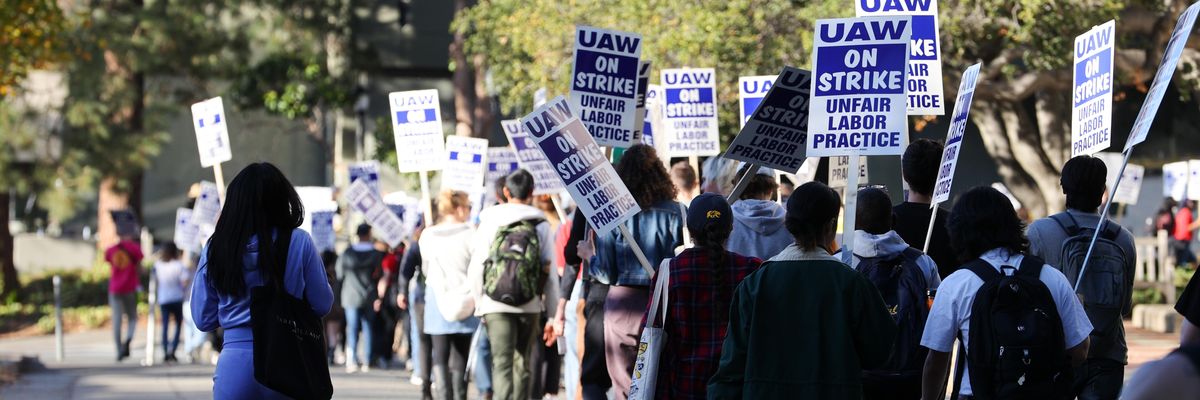A few days ago I spoke to some of the striking academic workers at the University of California. (You can view my remarks at their rally, below.)
These second-class workers reflect the same second-class system America has created throughout our labor market.
A total of 48,000 are on strike, making this the largest and most important strike in the history of American higher education. As labor historian Nelson Lichtenstein says, it could not only raise the incomes and the status of those who work in an "industry" that now employs more workers than the federal government, but also transform higher education itself.
You wouldn't know this from what you're reading in the mainstream press. The New York Times reports that academic workers "walked off the job...forcing some classes to be canceled...classes were disrupted, research slowed and office hours canceled ... only a few weeks away from final examinations."
Whenever you read that striking workers are causing harmful disruptions, note the implied bias, and consider that the status quo before the strike might have been even more harmful and disruptive to a large number of people.
One spur for this strike has been the extraordinary rise in housing costs and rents in California. Some of the academic workers at the University of California are paid so little that they've been living in their cars. Inflation has further eroded their paltry salaries.
Why should employees of the best public university in America, in the nation's richest state, in the wealthiest country in the world, live in poverty?
Last Friday, the University and the union representing tens of thousands of its striking academic workers agreed to ask an independent mediator to intervene.
Across American higher education, a large and growing portion of the responsibility for teaching and research has been borne by lecturers, adjuncts, graduate students, and post-doctoral students who are paid very little and have no job security. They are hired part-time, or are on year-to-year contracts, or are free-lancers who offer their expertise when needed.
These second-class workers reflect the same second-class system America has created throughout our labor market, and for the same reason: Employers want to pay as little as possible, and have maximum flexibility.
UC administrators plead budget constraints. Yet California is an immensely wealthy state with a budget surplus of almost $100 billion this year. Over the last several decades, however, state funding for UC, as well as the even larger state university system, has steadily declined. Today just over 10 percent of UC's budget comes from the state (down from more than half when in 1963 UC president Clark Kerr created the UC system). UC remains the jewel in the crown of American higher education, but excellence can't be sustained on the cheap.
So you might think (or hope) that California's progressive governor Gavin Newsom would take a lead in the strike on the side of workers, but he's been mum. Ditto the progressive California legislature.
The UC strike is not just an effort to raise thousands of academic workers out of near poverty. It's a movement whose success requires a reversal of the austerity that has subverted public higher education across America.
Here's a clip from my talk to the striking student workers:
